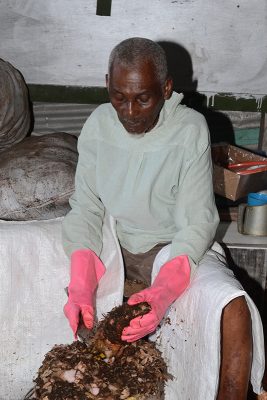It’s difficult not to see Linden as a community still struggling to recuperate from the protracted effects of the decline of an industry upon which the community had, for decades, depended far too thoroughly on and aside from which there has not, at least as yet, been found a feasible option.
Earlier this week the Stabroek Business had sought to find some answers to the riddle of Linden’s likely economic future through the eyes of its private sector. We found a local Chamber of Commerce hamstrung by a patent absence of a robust business community, an acute scarcity of really gainful employment and a handful of seemingly media-shy business houses that appeared less than keen on engaging us on the business climate in the one-time ‘mining town.’
We found the Chief Executive Officer of the Linden Enterprise Network (LEN), an amiable businesslike woman with degrees in Computer Science and Business Administration named Tannizia Gasper businesslike and accommodating. If there is an entity in Linden around which a sense of business evolves it is LEN.

LEN is a one-stop, state-funded agency whose overall mission is to develop an “entrepreneurial community” in Linden. It does so by providing “financial, business, physical, advisory services” and serves as a source of funding for small businesses in Region Ten. It offers loan financing for a handful of sectors including construction, logging and vending, its lending ceiling being $1 million dollars. The more modest businesses can access up to $500,000. In Linden’s circumstances, however, LEN is seen as a drop, albeit an important one, in the proverbial ocean of need. LEN may not prove – at least in the immediate term – to be radically transformative in terms of turning around the condition of economic hard times in Linden; at least however, its four hundred clients are demonstrating a measure of discipline in the repayment of their loans to the agency. Few people appear to complaining, at least audibly, about the repayment periods and the 8 per cent interest on lending.

LEN-funded projects can create an average of between two and eight jobs with the logging and construction sectors providing employment for up to four and ten persons, per project, respectively.
Those numbers, however, are still inadequate to cater adequately to the employment needs of the community. The reality is reflected on the streets of the one-time ‘mining town’ with high unemployment manifesting itself in idleness.
The LEN complex situated on Republic Avenue is itself mindful of the need to be business-savvy. It rents spaces to other agencies, housing up to ten tenants at this time.
LEN, the Stabroek Business was told will also be extending its range of services into the construction of low-cost homes for Lindeners. The project will commence with the provision of homes for persons already possessing lands and who have been challenged to secure commercial bank loans. Two-bedroom houses will cost $3.5 million and three-bedroom houses, $4.5 million. Lending arrangements have been negotiated with Republic Bank and with the New Building Society.
Limitations
The LEN initiative, however, is not without its considerable limitations. The agency’s CEO concedes that while the agency has witnessed some forward movement in the construction sector the vending trade has become saturated, a circumstance that renders the local private sector weak and under-motivated. Too many people, Gaspar says, sell groceries, clothing, plying their trade by either pushing a cart, operating a small stall or ‘walking and selling.’ Around half of LEN’s clients are vendors. It is not a sound commercial footing on which a community can be built.
Growth in the construction sector is reflected in the emergence of several block makers many of whom employ between two and four persons. One might even argue that there is something of a building ‘boom’ in Linden at this time. The block makers are however, beginning to clamour to bid for some of the lucrative state contracts. Hugh Stephens, a Contractor and a Consultant for LEN believes that such contracts must be preceded by consultations between state engineers and the Linden block makers.
LEN, meanwhile, is turning its attention to other needed community-based initiatives. Its recently promulgated 2018-2023 Strategic Plan embraces the creation of a farming-based food security plan. Currently, around 60 per cent of the food consumed in Linden is ‘imported’ from elsewhere in the country. On Fridays and Saturdays, various forms of motorized transportation descend upon Linden laden with ground provision, vegetables, fruit………..and even cooked food. They pay a toll and they sell.
Apiculture
There is talk about the development of an apiculture industry in Linden. Some training in the discipline has taken place and there have been some returns from the pursuit. More training will be undertaken next year and the sector is expected to secure a boost courtesy of the donation of twenty-five acres of land on the Soesdyke/Linden Highway by a Linden businessman.
At the end of every academic year around 600 young Lindeners leave school. There are few jobs for them so many of them migrate to other regions. Others pursue the option of higher education. Linden, over the years, has earned a reputation for producing scholars.
The viability of businesses in Linden is, in some instances, undermined by a scarcity of business skills. Some of the smaller enterprises are hard-pressed to keep up with the procedural rigours of preparing cash flow statements and providing receipts and that, in many cases is notwithstanding having undergone some level of training.
LCC
The sixty-member Linden Chamber of Commerce (LCC) does not exactly epitomize a preoccupation with business. It had been dormant for some time and was resuscitated in November 2017. Attempts to mobilize a representative sampling of its sixty members to meet with the Stabroek Business had failed so that we had to settle for meeting with just a handful. The Chamber sees its main focus as serving as a lobby group on behalf of the businesses in Region 10. But to do that they need to be attached to the mainstream business community in the country as a whole. They appear detached. We’d learnt that the LCC is only now in the process of gathering some of the critical information associated with rules governing investment in Guyana. Some of the sectors believed to hold some measure of promise for private enterprise in Region Ten include tourism, alternative energy, value added and agro processing and mining. Over the past twelve months, the Linden Chamber has held training sessions in Customer Service to cater for businesses in the services sector. A Business Consultant has been engaged by the LCC to assist members seeking various forms of business-related advice or contemplating engaging financing institutions. A workshop on writing business plans is scheduled to be held in about three weeks.
In the past year two new companies opened their doors in Linden. The owners are no strangers to Linden. FRENOGY is owned and managed by Norville Fredericks and is concerned with the provision of alternative energy, including refrigerators powered by solar and wind generated power and solar panels. The other, the trading name of which could not be recalled is focusing on promoting tourism in Linden.
Land ownership could seriously restrict business growth in Linden. Many business operators have no legal title to the lands. The Chamber says it plans to engage the Regional Chairman on the land issue.
Agriculture could hold some measure of economic potential for Linden but sustaining a reliable work force for bigger farming ventures has proven challenging. Logging and mining trumps farming on the totem pole of employment preferences. Chamber Secretary Staydon Payne told Stabroek Business that one of the current business ‘conversations’ in Linden has to do with how to woo more people to the land. The feeling that agriculture could turn the Linden economy around may be a fixation with some Lindeners though the community as a whole appears to have morphed into the ‘quick turnover’ business culture that vending in clothing and food epitomizes. A major infusion of financial resources and skills training apart, if Linden is to develop a rounded business culture a comprehensive attitudinal transformation will be necessary.










